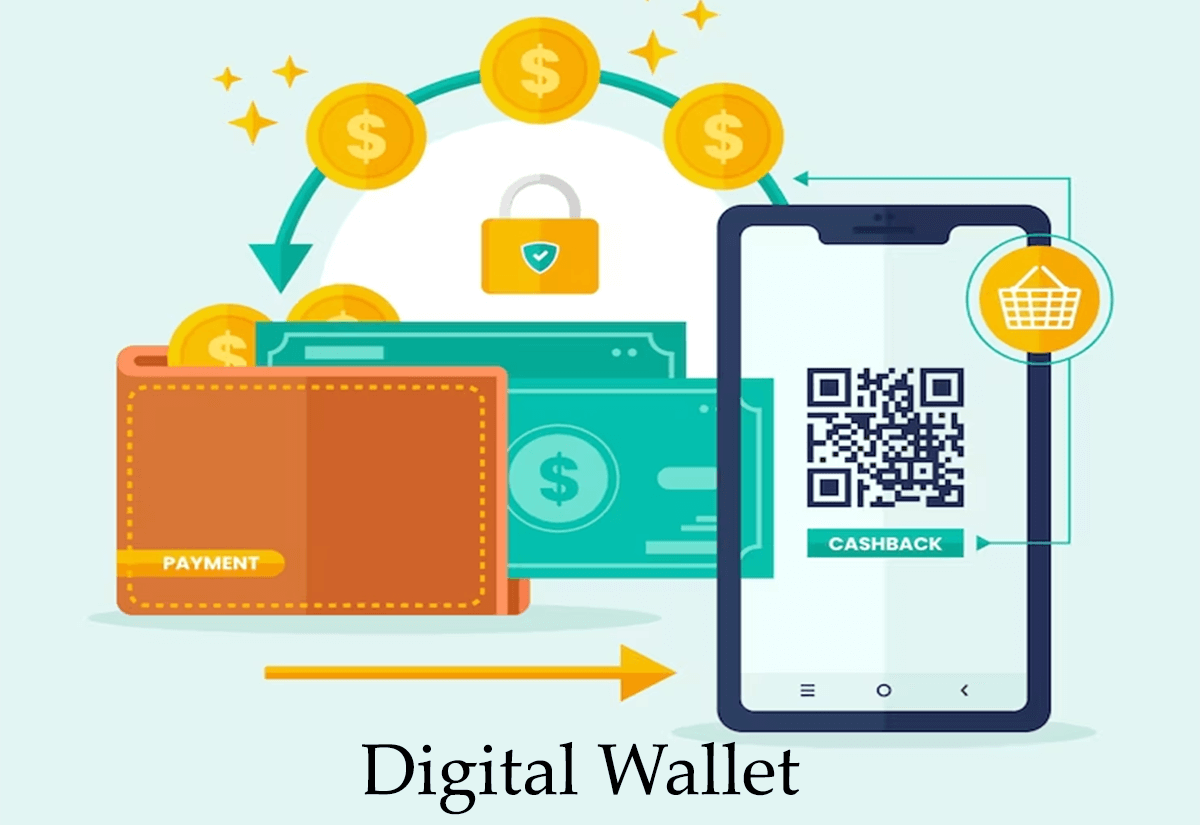What's Inside?
- What is Digital Wallet?
- How Does a Digital Wallet Work?
- Benefits of Digital Wallet
- Advantages and Disadvantages of Digital Wallet
- Examples of Digital Wallet
- Uses of Digital Wallet
- How to Choose the Best Digital Wallet?
- Is It Safe to Use a Digital Wallet?
- Frequently Asked Questions (FAQs)
- What is a digital wallet?
- How does a digital wallet work?
- What types of transactions can I make with a digital wallet?
- How secure are digital wallets?
- Can I use a digital wallet for international transactions?
- Are digital wallets compatible with all smartphones?
- Are digital wallets widely accepted by merchants?
- Can I add multiple payment cards to a digital wallet?
- What should I do if I lose my device or it gets stolen?
- Are digital wallets free to use?
In an era defined by digital advancements and technological innovation, traditional wallets are rapidly being replaced by their digital counterparts. The rise of digital wallets has revolutionized the way we handle our finances, making transactions quicker, more convenient, and increasingly secure. With just a few taps on our smartphones, we can now store, manage, and transfer our money and payment information effortlessly. From online shopping to peer-to-peer transfers, digital wallets have emerged as a game-changer, seamlessly integrating into our everyday lives. Here we delve into the world of digital wallets, exploring their functionalities, benefits, and the impact they have on our financial landscape.
What is Digital Wallet?
An e-wallet or digital wallet is like a virtual wallet on your phone or computer. It’s a secure app that stores your payment information and passwords for different websites and payment methods. A digital wallet enables you to securely store money in digital form, facilitating online purchases and various transactions. It provides a secure and convenient alternative to traditional cash or card payments, eliminating the need to carry physical currency or cards.
How Does a Digital Wallet Work?
A digital wallet, also known as an electronic wallet, securely holds users’ payment details and enables them to conduct transactions via their digital gadgets like smartphones, tablets, or computers. Here’s a general overview of how an e-wallet works:
Account Creation: Users create an account with a specific e-wallet provider. This typically involves providing personal information and linking the wallet to a payment source, such as a bank account or credit card.
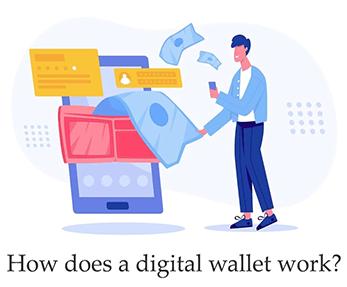
Loading Funds: Users can add funds to their e-wallet by transferring money from their bank account or by receiving funds from other sources like friends or family. Some e-wallets may also allow users to receive funds from their employer or other entities.
Storage of Information: Electronic wallets provide a secure repository for a wide array of data, encompassing credit/debit card particulars, bank account details, loyalty program specifics, and digital coupons, safeguarding them from unauthorized access.
Making Payments: When making a purchase or a payment, users can select the e-wallet as their preferred payment method at participating merchants or online platforms. The e-wallet securely transfers the payment information, such as the user’s card details or a unique token, to complete the transaction.
Security Measures: E-Wallets employ various security measures to protect users’ sensitive data. These can include encryption techniques, tokenization, biometric authentication (such as fingerprint or facial recognition), and multi-factor authentication to ensure secure access to the wallet.
Transaction Verification: After initiating a payment, the e-wallet may prompt the user to verify the transaction, often through a security code or biometric authentication. This additional step adds an extra layer of security to prevent unauthorized usage.
Transaction History and Management: E-Wallets offer users a detailed record of their transactions, enabling them to monitor spending, review previous purchases, and oversee their financial activities. Additionally, certain e-wallets may include features like budgeting assistance and expenditure analysis, aiding users in optimizing their financial management strategies.
Benefits of Digital Wallet
Digital wallets provide numerous advantages, fostering convenience and garnering popularity among users. Here are some of the key benefits of using a digital wallet:
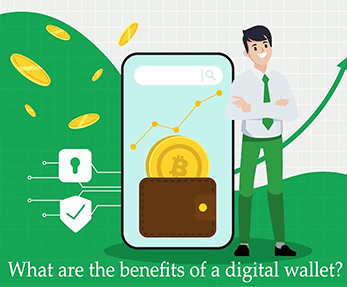
- Convenience: Digital wallets offer the convenience of making payments anytime and anywhere using just a smartphone or digital device.
- Speed: Transactions with digital wallets are usually faster compared to traditional payment methods, reducing checkout time.
- Security: Digital wallets use encryption and other security measures to protect user information, providing a secure way to store and transmit payment data.
- Accessibility: With a digital wallet, users have access to their payment information and funds at all times, allowing for quick and easy transactions.
- Expense tracking: Many digital wallets provide features to track expenses, helping users monitor their spending habits and manage their finances more effectively.
- Loyalty rewards: Some digital wallets integrate loyalty programs, offering rewards, discounts, or cashback incentives for using their services.
- Reduced need for physical cards: Digital wallets eliminate the need to carry multiple physical cards, making it more convenient and minimizing the risk of losing or misplacing them.
- Integration with other services: Digital wallets often integrate with other apps or services, allowing users to seamlessly make payments for rideshares, food deliveries, or online shopping.
- Peer-to-peer transfers: Many digital wallets enable quick and convenient peer-to-peer transfers, making it easy to split bills or send money to friends and family.
- Environmentally friendly: By reducing the need for paper receipts and physical transactions, digital wallets contribute to a more sustainable and eco-friendly way of handling payments.
Advantages and Disadvantages of Digital Wallet
Advantages:
- Convenient and easy-to-use payment method.
- Quick transactions and reduced checkout time.
- Enhanced security with encryption and authentication measures.
- Accessible anytime, anywhere.
- Efficient expense tracking and financial management.
- Integration with loyalty programs and rewards.
- Eliminates the need to carry physical cards.
- Seamless integration with other services and apps.
- Facilitates peer-to-peer transfers.
- Environmentally friendly, reducing the need for paper receipts.
Disadvantages:
- Dependency on digital devices and internet connectivity.
- Potential risk of data breaches and unauthorized access.
- Limited acceptance in certain establishments or regions.
- Incompatibility with older or outdated devices.
- Difficulty in resolving disputes or fraudulent transactions.
- Reliance on third-party providers for security and functionality.
- Potential loss of funds if the device is lost or stolen.
- Complexity in choosing the right digital wallet with suitable features.
- Privacy apprehensions arise when personal data is gathered and utilized.
- Lack of widespread awareness and understanding among users.
Examples of Digital Wallet
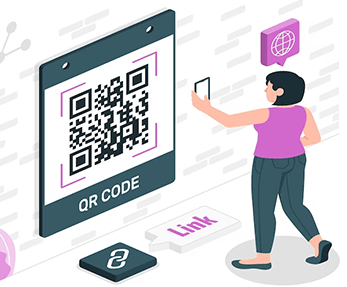
- Paytm: Paytm is one of the most popular digital wallets in India, offering a range of services including mobile recharges, bill payments, online shopping, and peer-to-peer transfers. It has a wide acceptance among merchants and users, with millions of transactions processed daily.
- PhonePe: PhonePe, a subsidiary of Flipkart, has gained significant traction in market. It allows users to make payments, transfer money, pay utility bills, book tickets, and more. PhonePe also offers rewards and cashback on transactions.
- Google Pay: Google Pay (formerly Tez) is a widely used digital wallet. It enables users to send and receive money, pay bills, book tickets, and make online purchases. Google Pay integrates with various Indian banks and supports Unified Payments Interface (UPI) for secure transactions.
- Amazon Pay: Amazon Pay is an e-wallet offered by Amazon that allows users to make online payments on various platforms, including Amazon’s own e-commerce website. It offers quick checkouts, cashback rewards, and easy integration with other services.
- PayZapp: PayZapp is a digital wallet and payment app offered by HDFC Bank. It provides a range of services such as bill payments, ticket bookings, and online shopping. PayZapp is known for its seamless user experience and strong security measures.
These are just a few examples of digital wallets in India, and there are other popular options available as well, such as Freecharge, MobiKwik, and Airtel Money, each with its own unique features and benefits.
Uses of Digital Wallet
Digital wallets offer a wide range of uses and applications in various aspects of daily life. Here are some common uses of digital wallets:
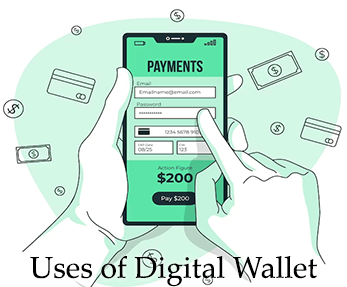
- Online Payments: Digital wallets allow users to make secure and convenient online payments for goods and services on e-commerce platforms, mobile apps, and websites.
- In-Store Purchases: Many digital wallets now support contactless payments, enabling users to make purchases at physical retail stores by simply tapping their smartphones or using QR codes.
- Peer-to-Peer (P2P) Transfers: Digital wallets facilitate quick and easy transfer of funds between individuals, allowing users to send money to friends, family, or acquaintances using their mobile contacts or QR codes.
- Bill Payments: Users can use digital wallets to pay utility bills, mobile phone bills, internet bills, and other regular payments, eliminating the need for manual transactions or visits to payment centers.
- Ticketing and Travel: Digital wallets frequently incorporate transportation services, enabling users to seamlessly reserve and purchase tickets for various modes of travel such as flights, trains, buses, and taxis, streamlining the process of making travel arrangements.
- Mobile Recharges: Digital wallets provide a convenient way to recharge mobile phone plans and data packs directly from the wallet app, saving time and effort.
These are some of the diverse uses of digital wallets, highlighting their versatility and convenience in managing financial transactions and enhancing the overall user experience.
How to Choose the Best Digital Wallet?
When choosing the best digital wallet for your needs, consider the following factors:
Security: Look for a digital wallet with robust security features, such as encryption, two-factor authentication, and biometric options, to ensure the safety of your financial information.
Compatibility: Check if the digital wallet is compatible with your device’s operating system (Android, iOS, etc.) and if it supports the payment methods you prefer (credit/debit cards, bank transfers, etc.).
Acceptance: Consider the acceptance of the digital wallet among merchants and service providers. Select a wallet that enjoys broad acceptance, whether you’re shopping online or at brick-and-mortar locations, to guarantee seamless usability and convenience.
User Interface and Experience: Opt for a digital wallet that has a user-friendly interface, intuitive navigation, and offers a smooth and seamless user experience.
Features and Functionality: Assess the features and functionality provided by the digital wallet, such as bill payments, loyalty programs, expense tracking, and peer-to-peer transfers, to determine if they align with your requirements.
Customer Support: Check if the digital wallet provides reliable customer support channels, such as email, phone, or chat, to assist you in case of any issues or queries.
Reviews and Reputation: Read reviews and consider the reputation of the digital wallet provider to gauge their reliability, customer satisfaction, and track record of security.
Integration with Other Services: If you frequently use specific services or apps, check if the digital wallet integrates with them, allowing you to conveniently make payments or access additional features.
Terms and Fees: Review the terms and conditions, including any applicable fees or charges associated with using the digital wallet, to ensure transparency and cost-effectiveness.
User Feedback: Consider feedback and recommendations from other users or trusted sources to get insights into their experiences with different digital wallets.
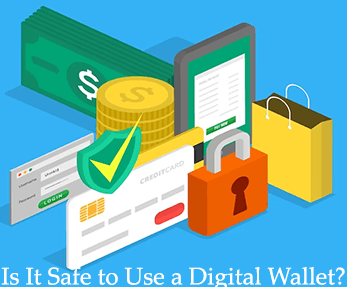
Is It Safe to Use a Digital Wallet?
Using a digital wallet can be safe if proper precautions are taken. Digital wallets employ security measures such as encryption, tokenization, and biometric authentication to protect user information. However, it is important to choose a reputable and trusted digital wallet provider and ensure that your device has adequate security measures in place, such as strong passwords and device locks. It is also crucial to keep your digital wallet app and operating system up to date to benefit from the latest security patches. Additionally, practicing safe online habits, such as avoiding suspicious links or sharing personal information, further enhances the safety of using a digital wallet.
In conclusion, digital wallets have revolutionized the way we handle financial transactions, offering convenience, speed, and enhanced security. With the ability to make payments, transfer money, track expenses, and enjoy various rewards and benefits, digital wallets have become an integral part of our digital lifestyles. However, it is crucial to choose a reputable and secure digital wallet provider, exercise caution while using the wallet, and stay vigilant against potential risks. As digital wallet technology continues to evolve, we can expect even more innovative features and seamless integrations, further shaping the future of how we manage our finances. So, tap into the power of digital wallets and embark on a secure, seamless, and empowered financial journey.

